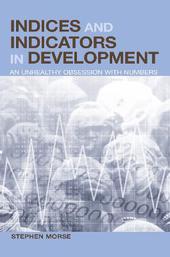
|
Indices and Indicators in Development: An Unhealthy Obsession with Numbers
Hardback
Main Details
| Title |
Indices and Indicators in Development: An Unhealthy Obsession with Numbers
|
| Authors and Contributors |
By (author) Stephen Morse
|
| Physical Properties |
| Format:Hardback | | Pages:224 | | Dimensions(mm): Height 234,Width 156 |
|
| Category/Genre | Development economics |
|---|
| ISBN/Barcode |
9781844070121
|
| Classifications | Dewey:338.90015195 |
|---|
| Audience | | Undergraduate | | Postgraduate, Research & Scholarly | | Professional & Vocational | |
|---|
| Illustrations |
Figures, tables, graphs, index
|
|
Publishing Details |
| Publisher |
Taylor & Francis Ltd
|
| Imprint |
Earthscan Ltd
|
| Publication Date |
1 October 2004 |
| Publication Country |
United Kingdom
|
Description
The use of numbers to condense complex systems into easily digested 'bites' of information is very much in fashion. At one level they are intended to enhance transparency, accountability and local democracy, while at another they provide a means of enhancing performance. However, all indicators suffer from the same basic problem that, ironically, is also their biggest advantage - condensing something highly complex into a few simple numbers. Love them or hate them, there is no denying that people use indicators to make decisions. Indices and Indicators explores the use of indicators within the field of human development. Part I provides a brief outline of the contested meaning of 'development' and how indices and indicators have been used as means of testing the realization of these development visions in practice in a range of institutional contexts. Part II discusses the limitations of such indices and indicators and illustrates how they are dependent upon the vision of development adopted. The book also suggests how indices and indicators can best be employed and presented. Given our overwhelming reliance on indices and indicators for measuring progress, directing policy and allocating resources, this book is essential core reading for academics, undergraduate and post-graduate students in social science, economics, geography and development studies as well as development practitioners, policy-makers and donor and international funding agencies.
Author Biography
Stephen Morse is Reader in Development Studies at the University of Reading and co-author of Sustainability Indicators (1999) and Measuring Sustainability (2003).
Reviews"The book is the third by Morse (Univ. of Reading, UK) in a series dealing with development indicators. His preceding two publications, coauthored with Simon Bell, are Sustainability Indicators: Measuring the Immeasurable (1995) and Measuring Sustainability: Learning by Doing (2003). While appreciating the usefulness of indicators and indexes in simplifying complex situations for decision making, Morse stresses in this new volume the importance of understanding how those indexes are constructed to avoid misuse by policy makers and managers working in development. After using simple examples to show how construction of an index can determine its results, he identifies various development indicators and their construction and assesses their limitations and possibilities for misuse. Indicators and indexes subjected to his scrutiny include gross national product and related measures of economic output; measures of poverty and income inequality; human development indexes based on life expectancy, literacy, and per capita income; and indicators of sustainable development. The volume is nicely formatted with numerous figures and tables that show interesting comparative data among countries. Technical presentation of indicator construction is generally confined to boxes separate from the ongoing narrative. Summing Up: Recommended. Upper-division undergraduate through professional collections."--E. L. Whalen, formerly, Clark College
|